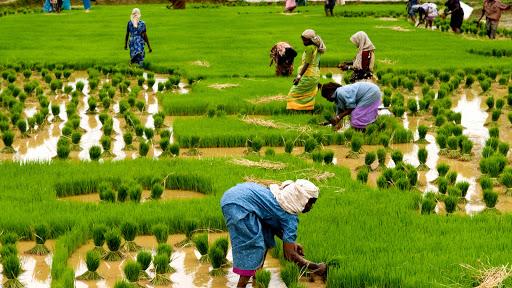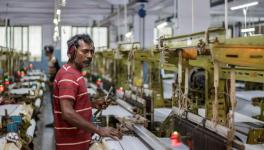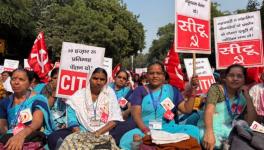COVID-19 in Rural India-XXIII: Timely Disbursal of Pensions, Foodgrains Come to Rescue of Farmers, Agri Labourers in Kerala

Representational image. | Image Courtesy: keralalabour.org
This is the 23rd report in a series that provides glimpses into the impact of COVID-19-related policies on life in rural India. The series, commissioned by the Society for Social and Economic Research, comprises reports by various scholars who have been conducting village studies in different parts of India. This report describes the impact of the nationwide lockdown on the farmers and agricultural labourers in Elavanchery gram panchayat in Palakkad district, near the Kerala-Tamil Nadu border. The timely announcement and disbursal of pensions and food grains through the public distribution system has allayed fears of starvation among the respondents. But those who are not eligible for any pension are still vulnerable if the lockdown does not end soon.
The Elavanchery gram panchayat is located in Nenmara block, Chittoor taluk in Palakkad district, near the Kerala–Tamil Nadu border. The panchayat is spread across 32.18 sq. km (in 14 wards) and has 4,120 households (2011 Census data). The total population of the village is 17,940, comprising 8,741 males and 9,199 females; the population density is 528 per sq. km and the male-female ratio is 1,077. While the literacy rate of the village is 76.38%; with a literacy rate of 71.53%, Chittoor taluk is one of the least literate taluks in Kerala. The 39 km long Kerala State Highway 58 that links Vadakkancherry to Pollachi passes through the panchayat. The major crops of the village are rice, ginger, groundnut, vegetables, rubber, coconut, bitter gourd and lentils. The panchayat depends heavily on water from the Chulliyar dam that flows through the Gayathri Puzha canal. Elavanchery is the tail end of the irrigation project. Apart from the dam, the panchayat also extracts water through lift irrigation and borewells. Most people depend on wells for drinking water. Lift irrigation is coordinated under the several local pada shekhara samitis (farm collectives formed in the 1980s). As per the website of the panchayat, there are 40 ponds in the panchayat. The panchayat has a Krishi Bhavan, which is a unit of the agricultural department that supplies seeds and coordinates agricultural activities.
Despite having a literacy rate below the state average, Elavanchery contributes the highest number of government employees in the state. This is due to the success of a Science Centre set up by a group of instructors from the total literacy movement to coach youth in the panchayat. This led to the establishment of more such training centres and has enabled more than a thousand youngsters (including housewives) to get government jobs. Historically, Elavanchery has been a site of caste and feudal exploitation, as well as resistance from agricultural workers in Chittoor taluk. Ezhavas, Nairs, Mannadiyars and some Scheduled Castes are the prominent agricultural castes.
The Impact on Farmers
Shanmukhan, a 74-year-old farmer from the Ezhava community lives with his wife (64) and son (35). Shanmukhan owns 3.5 acres of land, on which paddy is cultivated in two seasons. The first season begins by the end of May and ends by September. The second crop begins by October and ends by February-March. He also has 80 cents of land on which he grows vegetables, including bottle gourd, brinjal, cucumber, ginger, turmeric, and about 60 coconut palms.
The harvesting of his second crop of rice was completed on February 27, and it was procured by the Kerala Civil Supplies Corporation (Supplyco) at the Minimum Support Price of Rs 26.95/kg. According to Shanmukhan, the rice would have fetched only Rs 18/kg in the open market. Most farmers interviewed reported there has been an increase in the size of the harvest, from 2,200 kg per acre to 2,500-2,700 kg per acre after the 2019 floods in northern Kerala, owing to mineral-rich soil having been washed down from the hills. However, the procurement limit remained 2,200 kg based on earlier estimates, and it was only when the farmers raised the issue that the limit was increased to 2,500 kg per acre from March 2020.
The paddy harvest in Kerala has been procured by the state government through Supplyco since 2005. The farmers transport their harvest to agents, i.e., Supplyco-recognised mills, in Kalady and Thrissur. Then, the agents provide farmers a copy of the paddy receipt sheet (PRS) after conducting a quality check. One copy of the PRS is sent to Supplyco, which transfers money directly to the farmer’s account. When the farmer shows the PRS to the bank, the bank then issues a loan to the farmer based on the money deposited by Supplyco.
Also read: Kerala’s Covid Story is Hard to Replicate
Shanmukhan has received his copy of the PRS for his paddy crop, but he has not yet verified whether money has been transferred to his account. Farmers who have accounts in co-operative banks receive money in two or three days, but it takes longer for those who hold accounts in other commercial banks. Usually an official from the agricultural department, who is in charge of four or five panchayats, comes to inspect, ensure and approve the quantity for procurement. Due to lockdown, this process was delayed for some farmers. For Krishnankutti, a farmer who owns and cultivates 10 acres of paddy land, a delay like this could have been costly. However the issue was raised through the local unit of the All India Kisan Sabha, following which the agricultural department issued an order saying that the secretaries of the pada shekhara samitis could approve commodities for procurement, and so the process was completed in four to five days.
For planting, Shanmukhan recruits migrant labourers from North and North East India through labour agents. A group of three or four workers are paid Rs 4,000 to 4,500 per acre, along with food and one-way travel expenses. Workers to carry out weeding and other intermittent activities are sourced locally, or women agricultural labourers from Tamil Nadu are hired via agents. Some farmers have begun to form direct links with the workers to avoid having to go through agents. The migrant workers stay in the panchayat only for a few days during the agricultural season. Some of them are employed in nearby towns like Kozhikode on daily wages for the rest of the year. Some respondents said the migrant labourers were from Bihar, Orissa and West Bengal. The panchayat also has three brick kilns that employ north Indian and some Tamil labourers. These migrants reportedly stay for longer periods.
A large proportion of the population of Elavanchery is engaged in agricultural labour. According to two respondents, there are nearly 4,000 agricultural labourers in the panchayat; two-thirds of these are middle-aged and elderly women. The agricultural sector has been witnessing increased mechanisation in all areas except planting. The rent for tractors for tilling is between Rs 700 and 800 per hour, while for harvesters with belts (used for wet fields in the first paddy season), the rent is around Rs 2,400, and the rent for harvesters with tyres (used for drier fields in the second paddy season), it is around Rs 1,900.
Shanmukhan irrigates his land primarily using water from the canal. Since he is an experienced farmer and because his field lies at the tail end of the irrigation canal, he is also an advisory member of a committee formed to monitor the release of water from the Chulliyar dam that is presided over by the district collector. He owns a borewell primarily to water his vegetable garden and to supplement the water from the canal for his rice fields. He is also a member of the Thumbidi Karippayi Pada Shekhara Samiti (the local farm collective) that oversees agriculture and lift irrigation for about 250 acres. The lift irrigation setup suffered damage during the 2018 and 2019 floods. The farm collective presented a bill of Rs 60,000 for repair works to the government after the 2019 flood and the government paid compensation of Rs 43,000.
He has availed a crop loans of Rs 1,60,000 and a gold loan of Rs 60,000 from Canara Bank. He has also availed a Rs 1,00, 000 interest-free loan from the co-operative bank. According to one respondent, a total of Rs 4.68 crores had been loaned as interest-free loans to more than 650 farmers in the panchayat. Existing loans can be renewed upon approval from the village officer and agricultural officer in the panchayat. As these officers have not been able to carry out inspections due to the lockdown, the government has directed co-operative banks to pass resolutions and renew all existing loans.
Shanmukhan, like most farmers, has received Rs 8,500 in two installments as part of the state government’s farmer’s pension. His wife has also received Rs 500 in her Jan Dhan account. Apart from this monetary relief, the family has also received 15 kg of rice but has not yet received the grocery kit announced by the state government.
Sixty-eight-year-old Vasudevan used to be an agricultural demonstrator with the state agricultural department. He served for seven years as a gazetted employee before retiring. He owns three acres of land under paddy and one and a half acres under vegetables, coconuts, and fodder grass. He also practices dairy farming with four cows and practices pisciculture in his pond. Due to the lockdown, Vasudevan has found it difficult to find feed for his fish. While the grass for cows is available from his garden, he has had to delay inseminating one of his cows. He remarks that the veterinary department needs to take some measures to inseminate cows. Most farmers including Vasudevan are facing problems sourcing chicken and goat manure from Aanamalai and Pollachi in Tamil Nadu; this manure costs between Rs 90 and Rs 140 for a 10 kg bag. As borders remain closed due to lockdown, transport of this manure has almost entirely ceased.
While small farmers can harvest vegetables using family labour, relatively bigger farmers like Gopi, who taken a lease for five acres of land for mango as well as 12 acres for paddy are facing a labour shortage. The rice harvest and procurement went ahead smoothly, but the mango harvest could not be completed on time, and this has brought him a loss of Rs 3 lakh. The government has tried to help him by procuring a part of his harvest through its Vegetables and Fruit Promotion Council Keralam (VFPCK).
Also read: Covid-19 Lockdown: How Efficient Are State Governments?
One issue raised by all the farmers is the need to immediately repair the dilapidated small channels that feed the paddy fields built under the Command Area Development Authority (CADA). They believe this will reduce their irrigation costs considerably. Some farmers also raised the issue of non-disbursal of subsidies and bonuses for the last year. The farmers are supposed to receive around Rs 7,500 per acre in subsidies and bonuses. They alleged that some local administrative mismanagement has led to the recouping of the amount to the state treasury. One farmer reported that the amount was recently transferred back to the co-operative bank and is expected to be disbursed soon.
The Impact on Agricultural Labourers
As mentioned above, farmers in Elavanchery utilise local agricultural labour for non-mechanised tasks other than planting. Increasing mechanisation and the use of weedicide have reduced the demand for manual labour. The agricultural labourers interviewed reported that farm labourers in general are facing a crisis. Women form around 60-70% of local farm labour, but they only receive between Rs 300 and 350 as wages, while men receive between Rs 400 and Rs 700, depending upon the nature of the work. Also, it is only women who take up MGNREGS work, and they receive Rs 290 per day. No men are employed under the MGNREGS.
Sixty-nine-year-old former agricultural labourer Kumaran lives with his wife Radha (62), a son (32) and daughter-in-law. For as long as they can remember, Kumaran and his wife have been agricultural labourers. His son is a police constable who was recruited six years ago. Kumaran has stopped working as a labourer due to his age and he now receives a farm labourer’s pension from the government. Radha also does not do much farm work now but works under the MGNREGS. Kumaran has received Rs 8,500 in two quick installments as part of COVID-19 relief. However, his wife is not eligible for a pension because by the time she reached the pension age of 60, her son had taken up a government job. According to Kumaran, farm work has become scarce and mechanisation has replaced the need for labour. Manual labour in harvesting is now used only by owners of smaller plots or those who are unable to find a harvester in time.
Some agricultural labourers also practice vegetable farming on their homestead land. Subramaniam, a 50-year-old agricultural labourer grows bananas on the 20 cents of land around his house. He has managed to collect fertiliser and manure locally. He can sell his crop to Eco-Staff, an initiative by the Elavanchery panchayat to procure vegetables. He is also expecting to benefit from the new scheme begun by the state government to promote the growing of vegetables in small-scale home gardens to partly meet high demand during Onam. The panchayat has allocated Rs 32 lakh for this purpose. However, Subramaniam is worried that if the lockdown continues, he won’t be able to find work in the next cropping season. He has received 15 kg of rice and a grocery kit from the government.
All the agricultural labourers whom we spoke to said that relief work in the panchayat is being carried out exceptionally well. The community kitchen is working every day and providing food to many. Also, they appreciated the coordination between the Primary Health Centre, the panchayat and ASHA (Accredited Social Health Activist) workers, and noted that they are always out in the field, ensuring the lockdown is being observed, and visiting all homes to enquire about the health of the elderly.
One major demand raised by the agricultural labourers is to expedite and expand the ‘thozhil sena’ (Labour Army) that was recently formed by government. Thozhil senas were formed by the agricultural department to train workers to operate agricultural machinery. In Elavanchery, a thozhil sena was recently formed but only one hundred registered members are part of it. Interviewees expressed the hope that the government might expand the thozhil sena. Farmers like Shanmukhan and farm labourers like Subramaniam are also hopeful that the government will consider fully or partially waiving their loans.
Relief Measures
The state government had announced a relief package of Rs 20,000 crore two days before the national lockdown was announced. The package included the disbursal of Rs 8,500, i.e., seven months’ pension, each for around 55 lakh beneficiaries under the various welfare boards. All the farmers and agricultural labourers we interviewed, who are over the age of 60 have received two installments of their farmer’s pension from the state government, totalling Rs 8,500 (Rs 2,400 and Rs 6,100). While all the respondents have received 15 kg food grains from the PDS, grocery kits with around 16 items including tea and soap are still being distributed.
There is one community kitchen currently operated by Kudumbashree (local self help group) and the panchayat catering to more than 150 people, of which around 100 people are given free meals. The community kitchen provides food to the destitute, migrant labourers, adivasi elders, those under palliative care, the elderly who cannot cook and children who don’t have anyone to cook for them at home. Grains, vegetables and other items are sourced via contributions from the farmers and other civil society organisations. For instance, a farmer named Sankara Nayaranan contributed 52 coconuts and 25 kg bottle gourds from his farm. Apart from these individual contributions, youth organisations and volunteer groups such as the Democratic Youth Federation of India (DYFI) are also involved in collecting materials and providing volunteers to help carry out relief measures. Two Neethi (the cooperative pharmaceutical outlets run under state government) stores are also operational in Elavanchery, and provide subsidised generic medicines throughout the year.
Also read: COVID-19 Lockdown: Kudumbashree Takes Special Initiatives for Elderly in Kerala
While there were no migrant agricultural labourers in the panchayat when the lockdown was announced, half the labourers employed in the brick kilns could not go back to their villages. Most of these labourers are provided facilities and food by their contractors under government direction and some are provided food from the panchayat-run community kitchen.
Needless to say, the lockdown has created fears about the future among the agricultural community in the Elavanchery panchayat. However, the government has intervened to solve challenges as they have arisen with respect to the inspection of the harvest and procurement. The timely announcement and disbursal of pensions and food grains through the public distribution system has allayed fears of starvation among the respondents. But those who are not eligible for any pension are still vulnerable if the lockdown does not end soon. The commendable performance of the panchayat in organising COVID-19 relief measures and the role of ASHA workers and PHC employees were recurring themes in the case of almost all the respondents. Most respondents, including small farmers, have themselves contributed considerable amounts of vegetables and grain to the community kitchen, which is proof of the active participation and solidarity of the local people.
In terms of providing timely and substantive relief to the agricultural population, the interventions made by Kerala government stand apart in scope and intention. The stress on the panchayat as the nodal agency to implement relief measures along with the legacy of institutional and social decentralisation have substantially addressed the challenges of both the pandemic and the lockdown.
As Kerala is planning to gradually relax its lockdown and stagger back to productive activities, it is of utmost importance that the relief measures continue. Also, infrastructural problems such as the repair of CADA canals and the disbursal of subsidies need to be addressed soon. Initiatives such as the thozhil sena and the promotion of vegetable gardens need to be expedited and expanded to instill confidence and hope among the agricultural population.
[This report is based on telephonic interviews conducted with 10 mostly small and medium-scale farmers and three agricultural labourers between April 18 and 21, 2020.]
Rahul N is working as an Assistant Professor at the Institute of Management in Government, Thiruvananthapuram. Ranjith PM is an independent researcher.
Get the latest reports & analysis with people's perspective on Protests, movements & deep analytical videos, discussions of the current affairs in your Telegram app. Subscribe to NewsClick's Telegram channel & get Real-Time updates on stories, as they get published on our website.
























